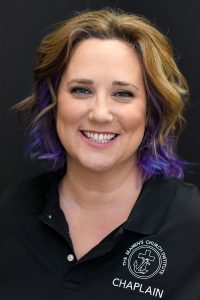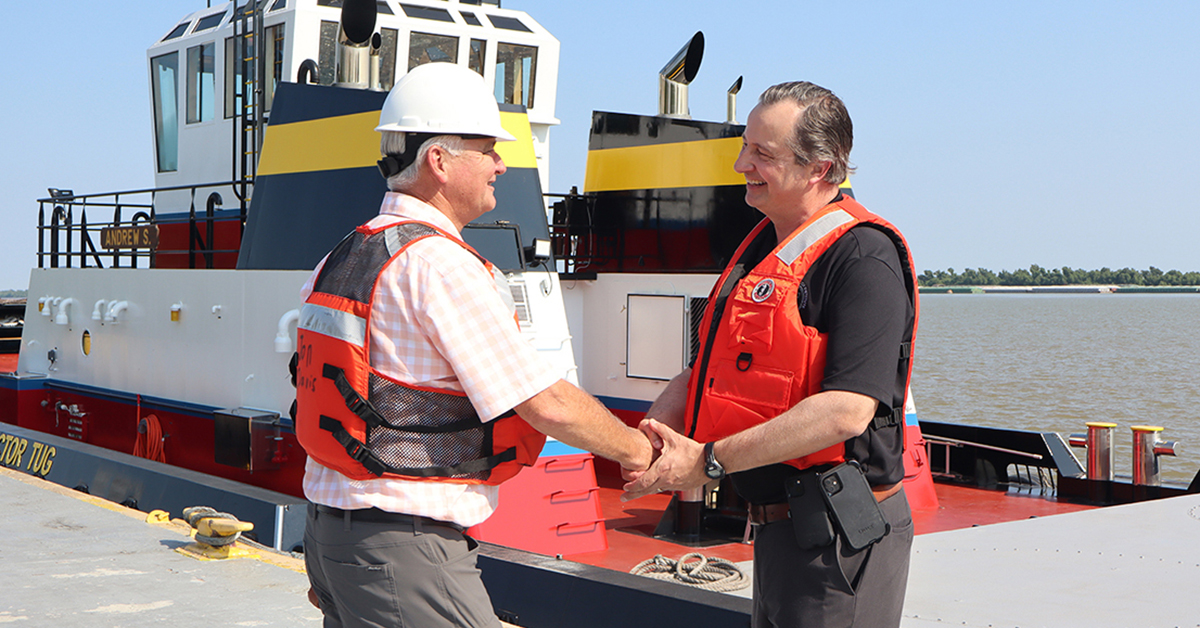Helping to ensure mariners’ mental wellness and working to prevent suicide are key aims of the Seamen’s Church Institute (SCI).
While simulator training through SCI’s Center for Maritime Education may be more familiar to towboaters, talking about mental and spiritual wellness is also important, said Philip Schifflin Jr., director of SCI’s Center for Mariner Advocacy.
Mariner Wellness Study
Schifflin and SCI Ministry on the River Supervisory Chaplain Grace Pardun had the opportunity to present the results of a joint study conducted by Yale University and SCI at the Gulf Intracoastal Canal Association in New Orleans, La., in August. The study reviewed existing academic literature and included interviews with inland marine industry executives. The goal was to identify wellness initiatives that have been used and to evaluate their effectiveness.
“The findings revealed that, while various initiatives have been attempted, none have been notably successful, with most showing only marginal results,” Schifflin said. “A particularly important insight from the interviews was that executives are eager to invest in mariner wellness but feel there is no clear roadmap for implementing or scaling effective programs. To me, however, this signals opportunity: if we can collectively develop such a roadmap, there is a strong willingness to adopt it.”
The study also highlighted cultural barriers.
“Many mariners themselves place limited value on wellness initiatives, making it difficult to achieve meaningful improvements without their buy-in,” Schifflin said. “Thus, changing cultural perceptions will be a critical first step.”
Another key finding was the need to strengthen the care offered not only to mariners but to their families. That could include efforts to improve communication, leadership training, nutrition, fatigue management and access to mental healthcare, Schifflin said.
Making Resources Available
At the American Waterways Operators summer safety meeting in Chicago, Schifflin moderated a panel of mariner wellness steering committee members. The panel outlined four active work groups: developing improved mental health screening tools for pre-employment or crew change; creating best practices for human resources professionals supporting mariners facing mental health challenges; addressing licensure issues for mental health providers so that mariners can continue care across state lines; and establishing return-to-work best practices after a mental health-related absence.

One way for companies to support mariners is by reviewing Employee Assistance Programs (EAPs) to ensure they meet the needs of mariners. Currently, only about 2 to 3 percent of mariners use an EAP program, Pardun said.
“Companies can share more about what the EAP offers and remind them that those are also confidential resources and that the counselors are not allowed to report back to the company about what happens,” she said.
Pardun said some companies may make assumptions that all employees know what resources are available because they learned about them in orientation. For EAPs to be more successful, though, it’s important for companies to continue talking about the program and what it offers.
Rather than just having a poster in a common area talking about the EAP program, Pardun said having captains show leadership about the importance of mental and emotional wellness, to know about the program and to be able to talk about it with their crews would be ideal.
“The captain sets the tone and the culture for the boat, so I would love it if companies would empower their captains to offer up the resources, to talk about the resources or to use them themselves so they can talk to the rest of the crew about their resources,” she said.
All of that would work toward removing the stigma of asking for help, Pardun said.
SCI’s chaplains can also help mariners to obtain mental health and wellness services. Conversations with chaplains are confidential unless a plan and means are actively in place for a mariner to hurt himself or herself, someone else or the boat, Pardun said. Even then, she said, chaplains talk to mariners before making those required disclosures.
“We are here to support their spirituality, not to push a certain agenda,” Pardun said. “Chaplains are uniquely called to be open and inclusive of all people’s religions, faith or lack thereof. All of that is fine. We’re not there to promote a spiritual agenda. We’re there to provide support however we can.”
Asking Tough Questions
Recognizing when a mariner may be struggling is an important first step, Pardun said, especially if a mariner may be considering suicide.
“For the most part, the signs are there, if we look closely,” she said. “A mariner’s hygiene might decline. You might hear words that hint at hopelessness: ‘You’re better off without me,’ or ‘I can’t do this anymore.’ There might be increased drinking, reckless behavior or even quiet goodbyes to family and friends. Strangely enough, sometimes a person who has been very depressed appears suddenly peaceful and happy. To outsiders, it looks like things are finally improving, but this could be a reflection of their relief over the decision to end their struggle.”
While it may be incredibly uncomfortable, the best immediate action someone can take is to ask what Pardun calls a life-saving question.
“You ask them if they’re struggling,” she said. “You ask them directly. ‘Hey, I notice you don’t seem like yourself. You seem like you’re not feeling good. Are you thinking about killing yourself?’ That can be a very scary question. That can be very awkward.”
She said it is important to know that asking the question is not putting it in the person’s mind.
“You can’t plant it in their mind,” she said. “It’s already there, so it’s best that you ask directly.”
Follow-up questions include, “Do you have a plan? Do you have the means to make this happen?” she said.
If they have a plan and are on a boat, it will be important to talk to the captain because it’s a safety issue for the boat.
“Most likely they don’t have a plan, or they’re planning on doing it when they get home,” Pardun said. “In that case, you can say, ‘Let’s call the chaplain together.’”
From this point, it may be possible to work with the person on a safety plan such as moving to a safer location, removing hazardous items or ensuring someone stays with them until help arrives.
Mariners may be afraid they will get in trouble or somehow be penalized by asking for help, but there is a big difference between suicide ideation and actually having a plan and intent, Pardun said.
“They do need to tell somebody, though,” she said.
Pardun added, “There are many companies who, if you’re in a mental health crisis, they figure out a way to care for you and work with you.”
SCI’s crisis hotline is also available around the clock at 800-708-1998. The operator who answers will call the chaplain. That chaplain can come out to the boat to physically be present or can be available for phone support.
Supporting Mariners
Mariners need to know that companies are asking how to support them better. SCI offers Applied Suicide Intervention Skills Training, a two-day program, and SafeTALK, a four-hour program. Chaplains are available to partner with companies, captains and shoreside staff to build education strategies that make sense for their communities and crews, Pardun said.
Mariners can also help look after their own health by getting quality sleep during at least one of their off-duty periods, cutting back on substance use on their time off, reducing dependence on energy drinks and caffeine and by exercising.
“It’s tough when you have such a physical job to want to even do exercise, but you do need to do exercise that’s different than your work to help offload your stress,” Pardun said.
She also acknowledged that it is difficult to develop a wellness routine when many mariners have very different lives during their 28 days on the boat compared to their 28 days off.
Interestingly, Pardun said that when she asked a group of about 20 mariners at a recent crew change if their mental health was worse on the boat or at home, they unanimously said at home.
“They can’t get away from the stressors at home, whereas on the boat it’s simple and structured, and the people they’re around understand what their lives are like on the boat,” she said. “At home, they might not understand.”
That means it is important for mariners’ families to prioritize their health at home, too.
“Every family is going to be different, and every need is going to be different, but I think it’s important to have an understanding that they might need time to adjust,” she said.
One practice that may be beneficial whether at home or on the boat is integration of some kind of spirituality into mariners’ lives, and that doesn’t necessarily mean reading the Bible or going to church, Pardun said. Examples could include meditation, gratitude exercises, conversation with those who are supportive and reflective reading.
“There are ways to engage in your spiritual life that can improve your resiliency and your mental health,” she said.
With one company, SCI leads a brief discussion at crew changes and will then lead the crew in a meditation practice or breathing exercise before giving crewmembers a tool they can use on the boat.
“It’s a three-minute spiritual practice, and it can improve your mental state, which can help you be safer on the boat,” Pardun said.
She also stresses “practicing the pause.” That means purposefully pausing to self-assess, whether that’s during or immediately after stressful moments or even in peaceful ones.
“It can feel like a luxury to pause and notice something beautiful,” she said. “It’s not a luxury. It’s a necessity for you to be able to go out there and do the hard work. We need those pauses, and those pauses do make us function better.”
Pardun said her main message is, “The mariner is worth investing in,” and that’s a message she focuses on with companies, crews, families and individual mariners.
“The humans are the greatest asset of this industry,” she said, “and sometimes we forget how beloved and cherished those humans are.”
Featured image caption: Phil Schifflin, director of the Seamen’s Church Institute’s Center for Mariner Advocacy, concludes a vessel tour aboard a Bisso Towboat harbor tug. (Photo courtesy of Seamen’s Church Institute)



